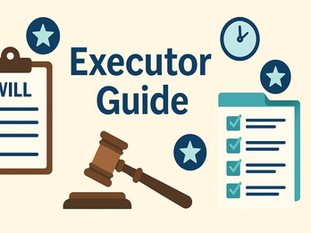
7 Overlooked Steps That Make - or Break - an Illinois Estate Plan
Jul 15
2 min read
0
9
0
When people think of “estate planning,” they usually picture a thick binder of legal documents. While wills and trusts are essential, the process is more than paperwork. Below are seven often-missed steps that separate a smooth administration from an expensive headache—plus links to resources we’ve built to help you tackle each item.
1. Retitle—or “Fund”—Assets into Your Trust
A revocable living trust saves probate fees only if it owns your assets. Double-check deeds, bank accounts, and brokerage registrations. Our interactive Trust Funding Checklist walks you through every category, from real estate to digital currency.
2. Update Beneficiaries After Major Life Events
Marriage, divorce, or a child’s birth can leave insurance or IRA beneficiary forms out of date. Review designations annually and use a Pour-Over Will for stray assets.
3. Use the Illinois Healthcare Directive—Not Just a POA
A Health-Care Power of Attorney names who will decide; the Healthcare Directive tells them what you want in end-of-life scenarios. Both belong in your plan.
4. Inventory Your Digital Footprint
Most executors have no idea where your crypto wallet or Dropbox lives. Create a secure list with our downloadable Digital Asset Inventory Tool and store it with your estate documents.
5. Know When Illinois Estate Tax Kicks In
The state exemption is just $4 million—far below the federal level. Run the numbers with our live Illinois Estate-Tax Calculator to see if a credit-shelter trust or gifting strategy makes sense.
6. Coordinate Special-Needs Planning
Leaving money outright to a disabled beneficiary can revoke SSI or Medicaid. A properly drafted Special Needs Trustpreserves benefits while improving quality of life.
7. Keep Funding Proof in One Binder
After you deed the house or retitle a brokerage account, file copies behind a single tab. Future trustees—and the court—will expect evidence. See our full Estate-Planning & Probate Process for timing and record-keeping tips.
Ready to Review Your Plan?
Browse our flat-fee Services to see what’s included.
Book a no-pressure consultation or Get Started online in minutes.
Have questions? Call 312-373-0731 or email contact@illinoisestatelaw.com.
A few proactive tweaks today can save your family months of court delays tomorrow. Let us know how we can help.






